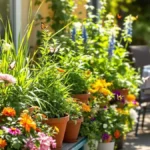The wasp, often seen as a misunderstood creature, plays a vital role in the ecosystem. As predators of harmful insects, these insects contribute to the regulation of biodiversity. Their presence attracts various natural predators such as insectivorous birds, bats, and spiders, which together help maintain a harmonious balance in your garden. Promoting these allies can enrich your green space while reducing the need for pesticides.
The essential information
- Wasps: indispensable creatures in the ecosystem.
- Regulation of insects and contribution to biodiversity.
- Natural partners: predators in the garden like birds and bats.
- Encouraging predators while minimizing pesticide use.
Discover how a simple mixture of white vinegar can keep mosquitoes away from your home
The wasp: a misunderstood creature, yet essential
Often perceived as a pest, the wasp plays a crucial role in our ecosystems. These insects, beyond their negative reputation, are key players in regulating populations of other insects. Their presence in our natural environment should not be overlooked, as it greatly contributes to biodiversity and the balance of ecosystems.
Contributing to the ecosystem: regulation of insects, biodiversity
Wasps are effective predators of harmful insects. By offering natural control of insect populations, they help maintain balance in the garden. Their ability to reduce the number of insects that can damage crops is beneficial for gardeners who care about their plants. Therefore, even if the wasp may seem aggressive, its value in the ecosystem is undeniable.
Natural predators: allies in the garden, limiting wasp populations
In this complex dynamic, it is essential to recognize the natural predators that help control wasp populations. Insectivorous birds such as the European bee-eater, the black redstart, and tit species play a significant role by feeding on adult wasps. These birds add a fascinating dimension to our gardens while participating in the regulation of the ecosystem.
Bats: nocturnal predators, echolocation, eliminating hundreds of insects
Bats also intervene in this battle. Thanks to their ability of echolocation, they effectively hunt flying insects, including wasps. A single night can result in the elimination of hundreds of insects, demonstrating the vital role these mammals play in preserving the ecological balance of gardens.
Amphibians and reptiles: terrestrial trackers, weakened prey
Amphibians and reptiles also participate in regulating wasp populations. By hunting larvae and weakened specimens, they add another layer to the food chain. This interaction strengthens the connections within the ecosystem, highlighting the importance of preserving every species present.
Spiders: silent traps, praying mantises, interception in mid-flight
Spiders, although not direct predators of wasps, can trap these insects in their webs. Praying mantises and other opportunistic predators attack wasps that come within their reach, illustrating the fragility of ecological dynamics. The interconnection between species is fascinating and demonstrates the importance of preserving natural habitats.
Intra-species rivalries: cannibalism in certain wasp species, natural selection
Interestingly, some species of wasps practice cannibalism, which plays a role in natural selection. This competition for survival may seem cruel, but it helps maintain healthy populations adapted to their environment. Less competition often means stronger and more beneficial wasps in the ecosystem.
Encouraging predators: birdhouses, shelters, ponds, beneficial for biodiversity
To encourage the presence of these natural predators, there are simple ways to promote their habitat. Installing birdhouses, shelters, or even creating ponds can attract not only birds but also various insectivores, thereby contributing to a thriving ecosystem. Each element introduced into the garden becomes a step toward increased biodiversity.
Less pesticides: ecological approach, garden harmony
Adopting an environmentally friendly approach by reducing the use of pesticides is another way to foster a healthy garden. By creating a natural balance, we allow wasps and their predators to play their roles, reducing the need for chemical treatments. This not only promotes plant health but also preserves species diversity.
Role of wasps: predators of harmful insects, participation in pollination
Wasps, through their predatory role, not only control populations of harmful insects but also contribute to the pollination of certain plants, just like bees. Their presence in our gardens is therefore multifaceted, providing as many benefits as one might expect from other pollinators.
Balance: helpful wasps without being invasive
The challenge lies in establishing a balance. Wasps, although they can sometimes become invasive, are primarily there to maintain a functional and harmonious ecosystem. Respecting these creatures and understanding their role is essential for those who wish to cultivate a prosperous garden.
Garden atmosphere: living displays, interaction between species
Finally, the atmosphere of a garden is enriched by the presence of different organisms, including wasps and their predators. These interactions create living displays, where nature thrives due to the diversity of species. By fostering these relationships, gardeners can enjoy a vibrant and healthy green space, ensuring greater harmony with the natural environment.







